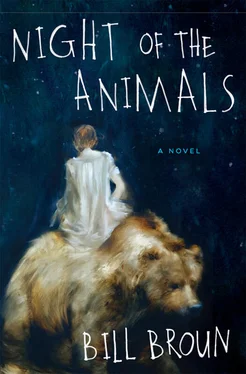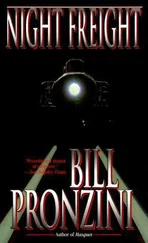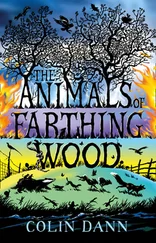“Roight, yow scallywags — against the wall,” he ordered. Cuthbert and Drystan jumped up and stood shoulder to shoulder, refusing to smile, folding their little scapulas against the dark wall like stunted bone wings. Cuthbert was actually shaking with fear; all too often, any kind of boisterousness on his father’s part, especially with a lager or two, ended up with Drystan being hit, again and again, with a belt, and then him.
Drystan began spinning his hawthorn twig like a green propeller in his hand. He stuck it in his mouth, made a silly face, then a serious one.
“Smile!” their father commanded. Finally, Cuthbert started snickering, then Drystan laughed, and the magnesium flashbulb exploded.
In the white-hot actinic light, Drystan’s face glowed with a robust, dark merriment. He looked different. The usual childlike fragility braced by his high cheekbones had receded. His russet-brown eyes looked smaller, harder. There was that green-leaved twig jauntily in his teeth. One could just make out something new — the forceful gaze of a man, emerging from the boy — angry, bold, honorable, and all things his father wasn’t.
For years, Cuthbert kept the resulting photograph, carrying it everywhere, a stiff, white-framed square of color emulsion paper, his silver-halide talisman against oblivion. He took it onto the brownfields and doss houses and alleyways of England, until eventually, after thousands and thousands of warm orbs of Flōt, he could hardly work out why it was so important. It was the last photograph of Drystan in the universe, but when it disintegrated, soaked with urine in his pocket, he didn’t even know it.
the prophecy of an animal lord
IN THE COUNTRYSIDE, IN THE ERA BETWEEN THE great world wars, and nearly a century before the death of King William, the depredations of King Harry9, and the coming of a new king, the soul of England did begin to waver. Long before the zoophobia and existential threats of Heaven’s Gate, the languages of animals seldom were heard, and even among the few Britons left who still prayed to the “owd green saints,” as Winefride Wenlock called them, almost no one knew enough to resist the gathering silence.
There were exceptions to the dying hush of the animals, even in Winefride’s lifetime, “hidden as plain as your chops,” as she’d say, most from the “golden age” of English animal stories. Countless British parents read Peter Rabbit to their children, she liked to claim, never grasping that the sad-eyed, dark-haired Beatrix Potter, whom Winefride had seen admiringly in one of the illustrateds, had spent much of her childhood and early adulthood speaking, secretly, to animals.
“Oh, ’tis as true as I stonds ’er! You know how little Benjamin Bunny gathered those onions to take down into his mum’s bury?” Winefride had asked Cuthbert and Drystan earlier that morning as they sat squeezed into the backseat of the Imp on the trip west from Birmingham. “And all about his and Peter’s escape from that gallus cat? Well, Mrs. Potter had summut in her ’yud besides nits and lice to wroit all that, with these good animals acting the very moral of animals that talk — oh, Mrs. Potter knew to the tongue of rabbits and hares, be sure — probably learnt from that old Belgian buck rabbit they say she had at her house.
“Thee canna write like that about hares without lashions of the Wonderments in thee,” she said.
But she said she didn’t see much evidence of Wonderments anymore, not since the Great War.
“If I had the strength to clomber over to a library more often, I’d probably find I don’t know what I’m mithering on about,” she told Drystan and Cuthbert. The cold eyes of their mother, who sat up front, appeared in the rearview mirror. They could see her shaking her head, before turning to stare out her window with an almost predatory disinterest. Winefride continued, “But still, it’s sorely hushed these days with the animals — hardly a naise!”
The notion of a great calm among animals before the arrival of a terrible messiah became a deeply felt, if eccentric, eschatology in Cuthbert’s and Drystan’s young psyches. Winefride would proffer the idea anytime a neighborhood spaniel stopped barking or a nightingale suddenly abandoned its song.
“My grandfather used to say that when the animals go quate, it means Jack in the Green’s right ’round the corner,” she once said. “Better look out! ’Tis true as christened apples on St. Swithin’s Day.”
“Jack in the Green?” Drystan quipped. “That some kind of pudding or bread or summut, and you put those ’oly apples on it?”
Their gran had laughed. “No, no. Jack’s the same Jack as Jack’s Alive. The Green Man. The Lush One. Robin Goodfellow. Puck. The Christ of Otters.”
“Otters? I don’t like otters. I like tigers. Can’t we have tigers?” asked Drystan.
“Or dragons?” asked Cuthbert.
“No, no,” their grandmother had said. “The otter — he’s the one we’ve got in England, and others have theirs.”
The Christ of Otters was that peculiar face with ivy in its nostrils and a halo of grapevines, staring from forgotten corners of British churches, from corbels and column capitals, grave slabs and misericords, with an expression of furious fecundity. According to the legends of the Wonderments, as Cuthbert’s gran described them, the Christ of Otters was to return one day to England, in the flesh, after a Great Hush in which the nation struggled then endured a deceptive ascendancy. And a risen St. Cuthbert would usher the way.
“’A comes after we’ve been down on our duffs for a while,” she’d once explained. “And there will be a star in the sky — in the east. Look for it, boys.”
The Christ of Otters’ arrival would mark the precise moment of the nadir of humankind on earth, and the beginning of the slow return of a new equilibrium.
“Now don’t get me wrong,” she once told Cuthbert. “I go churching for Jesus Christ our Savior, son of Joseph, son of Heli, Matthat, Levi, et cetera and whatnot.” But she went on to say how those Wonderments “told your owd gran and those before for all time” that God had made a special promise to the animals of Albion.
“’E’d given ’em souls, ’a did,” she said. “And it was down to all the good things they done for all of us, especially out here in the Marches. And they would get their own saint — an animal Lord.”
Souls for their service to England. That was the covenant between humans and Great Britain’s animals, passed down in the Wonderments, as Cuthbert came to understand them. Such inspired animals of the covenant ought never be caged, or looked down upon. “They’ve their own yuds,” his gran always said. They possessed animal motives and animal values; they had a few special saints across the British Isles, their own green shoots off their own Tree of Jesse — St. Aristobulus, St. Columba, and St. Cuthbert; they had their own Cains and Judases. The animals of Britannia did not look for the resurrection of the dead; they sought to live with dignity and purpose in their ensouled eminence. So declared the Wonderments.
“God gave ’em souls, and what did the English give ’em?” she’d once asked. “A slaughterhouse in every town — a bunch of clarty land, dorty seas, rivers turned into gubbon holes, *and thousands of book-learnt clish-clashers who say the bastes *are nothing but bondservants or jumbles of chemicals or whatnot. No wonder they went quate!”
As Winefride remembered it, the Wyre Forest before the Second World War seemed like the last verdant haven against all this, a place of glory and grief somewhere between Eden and Gethsemane.
“It always ’ad a rainbow above it — the ‘bow in the cloud.’ A special green and gold one, like the one God had shown Noah after floodwaters. When I was a much younger lass, ’twas paradise to me, and to the animals,” she had said that morning, in the car. Drystan had been plucking habitually at the end of a dark green thread in the Hillman’s springy plaid upholstery. As he began to pull it, his gran gently took his hand in hers to stop him. “The beasts loved the forest. But they knew its end was coming, and it broke their wild hearts.”
Читать дальше












